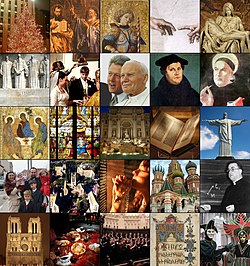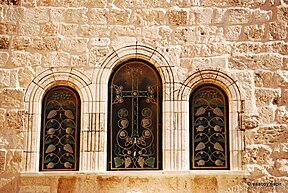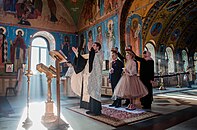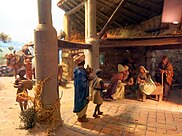
Back ثقافة مسيحية Arabic فرهنگ مسیحی Persian Kristillinen kulttuuri Finnish תרבות נוצרית HE 기독교 문화 Korean Cultur cristian LFN ख्रिश्चन संस्कृती Marathi Kultura e Krishterë Albanian Văn hóa Kitô giáo Vietnamese 基督教文化 Chinese
| Part of a series on |
| Christian culture |
|---|
 |
| Christianity portal |
Christian culture generally includes all the cultural practices which have developed around the religion of Christianity. There are variations in the application of Christian beliefs in different cultures and traditions.
Christian culture has influenced and assimilated much from the Middle Eastern,[1][2] Zoroastrianism,[3] Greco-Roman, Byzantine, Western culture,[4] Slavic and Caucasian culture. During the early Roman Empire, Christendom has been divided in the pre-existing Greek East and Latin West. Consequently, different versions of the Christian cultures arose with their own rites and practices, Christianity remains culturally diverse in its Western and Eastern branches.
Christianity played a prominent role in the development of Western civilization, in particular, the Catholic Church and Protestantism.[5] Western culture, throughout most of its history, has been nearly equivalent to Christian culture.[6] Outside the Western world, Christianity has had an influence on various cultures, such as in Africa and Asia.[7][8]
Christians have made a noted contributions to human progress in a broad and diverse range of fields, both historically and in modern times, including science and technology,[9][10][11][12][13] medicine,[14] fine arts and architecture,[15][16][17] politics, literatures,[17] music,[17] philanthropy, philosophy,[18][19][20]: 15 ethics,[21] humanism,[22][23][24] theatre and business.[16][25][26][27] According to 100 Years of Nobel Prizes a review of Nobel prizes award between 1901 and 2000 reveals that (65.4%) of Nobel Prizes Laureates, have identified Christianity in its various forms as their religious preference.[28]
- ^ Pacini, Andrea (1998). Christian Communities in the Arab Middle East. Clarendon Press. ISBN 9780198293880. Retrieved 29 April 2016.
- ^ "The historical march of the Arabs: the third moment".
- ^ Grabbe, Lester L. (27 July 2006). A History of the Jews and Judaism in the Second Temple Period (vol. 1): The Persian Period (539-331BCE). Bloomsbury Publishing. ISBN 978-0-567-21617-5.
- ^ Caltron J.H Hayas, Christianity and Western Civilization (1953), Stanford University Press, p.2: "That certain distinctive features of our Western civilization – the civilization of western Europe and of America— have been shaped chiefly by Judaeo – Graeco – Christianity, Catholic and Protestant."
- ^ Cite error: The named reference
Cambridge University Historical Serieswas invoked but never defined (see the help page). - ^ Dawson, Christopher; Glenn Olsen (1961). Crisis in Western Education (reprint ed.). CUA Press. p. 108. ISBN 9780813216836.
- ^ Curtis, Michael (2017). Jews, Antisemitism, and the Middle East. Routledge. p. 173. ISBN 9781351510721.
- ^ D. Barr, Michael (2012). Cultural Politics and Asian Values. Routledge. p. 81. ISBN 9781136001666.
- ^ Sheridan Gilley; Brian Stanley, eds. (2006). The Cambridge History of Christianity: Volume 8, World Christianities C.1815-c.1914. Cambridge University Press. p. 164. ISBN 0521814561.
Many of the scientists who contributed to these developments were Christians
- ^ Steane, Andrew (2014). Faithful to Science: The Role of Science in Religion. OUP Oxford. p. 179. ISBN 978-0191025136.
the Christian contribution to science has been uniformly at the top level, but it has reached that level and it has been sufficiently strong overall
- ^ L. Johnson, Eric (2009). Foundations for Soul Care: A Christian Psychology Proposal. InterVarsity Press. p. 63. ISBN 978-0830875276.
Many of the early leaders of the scientific revolution were Christians of various stripes, including Roger Bacon, Copernicus, Kepler, Francis Bacon, Galileo, Newton, Boyle, Pascal, Descartes, Ray, Linnaeus and Gassendi
- ^ "100 Scientists Who Shaped World History". Archived from the original on 19 November 2005. Retrieved 29 April 2016.
{{cite web}}: CS1 maint: unfit URL (link) - ^ "50 Nobel Laureates and Other Great Scientists Who Believe in God". Archived from the original on 24 May 2007. Retrieved 29 April 2016.
{{cite web}}: CS1 maint: unfit URL (link) - ^ S. Kroger, William (2016). Clinical and Experimental Hypnosis in Medicine, Dentistry and Psychology. Pickle Partners Publishing. ISBN 978-1787203044.
Many prominent Catholic physicians and psychologists have made significant contributions to hypnosis in medicine, dentistry, and psychology.
- ^ "Religious Affiliation of the World's Greatest Artists". Archived from the original on 11 December 2005. Retrieved 29 April 2016.
{{cite web}}: CS1 maint: unfit URL (link) - ^ a b "Wealthy 100 and the 100 Most Influential in Business". Archived from the original on 19 November 2005. Retrieved 29 April 2016.
{{cite web}}: CS1 maint: unfit URL (link) - ^ a b c E. McGrath, Alister (2006). Christianity: An Introduction. John Wiley & Sons. p. 336. ISBN 1405108991.
Virtually every major European composer contributed to the development of church music. Monteverdi, Haydn, Mozart, Beethoven, Rossini, and Verdi are all examples of composers to have made significant contributions in this sphere. The Catholic church was without question one of the most important patrons of musical developments, and a crucial stimulus to the development of the western musical tradition.
- ^ A. Spinello, Richard (2012). The Encyclicals of John Paul II: An Introduction and Commentary. Rowman & Littlefield Publishers. p. 147. ISBN 978-1442219427.
The insights of Christian philosophy 'would not have happened without the direct or indirect contribution of Christian faith' (FR 76). Typical Christian philosophers include St. Augustine, St. Bonaventure, and St. Thomas Aquinas. The benefits derived from Christian philosophy are twofold.
- ^ Roy Vincelette, Alan (2009). Recent Catholic Philosophy: The Nineteenth Century. Marquette University Press. ISBN 978-0874627565.
Catholic thinkers contributed extensively to philosophy during the Nineteenth Century. Besides pioneering the revivals of Augustinianism and Thomism, they also helped to initiate such philosophical movements as Romanticism, Traditionalism, Semi-Rationalism, Spiritualism, Ontologism, and Integralism
- ^ Hyman, J.; Walsh, J.J. (1967). Philosophy in the Middle Ages: The Christian, Islamic, and Jewish Traditions. New York: Harper & Row. OCLC 370638.
- ^ Brown, J. (24 July 2014). Encyclopaedia Perthensis, Or, Universal Dictionary of the Arts, Sciences, Literature, Etc. : Intended to Supersede the Use of Other Books of Reference, Volume 18. University of Minnesota. p. 179. ISBN 978-0191025136.
Christians has also contributed greatly to the abolition of slavery, or at least to the mitigation of the rigour of servitude.
- ^ Pinn, Anthony B, ed. (9 September 2021). The Oxford Handbook of Humanism. Oxford University Press. doi:10.1093/oxfordhb/9780190921538.001.0001. ISBN 978-0-19-092154-5.
- ^ Davies, 477
- ^ Löffler, Klemens (1910). "Humanism". The Catholic Encyclopedia. Vol. VII. New York: Robert Appleton Company. pp. 538–542.
- ^ Hillerbrand, Hans J. (2016). Encyclopedia of Protestantism: 4-volume Set. Pickle Partners Publishing. p. 174. ISBN 978-1787203044.
In the centuries succeeding the Reformation the teaching of Protestantism was consistent on the nature of work. Some Protestant theologians also contributed to the study of economics, especially the nineteenth-century Scottish minister Thomas Chalmers.
- ^ "Religion of History's 100 Most Influential People". Archived from the original on 28 November 1999. Retrieved 29 April 2016.
{{cite web}}: CS1 maint: unfit URL (link) - ^ "Religion of Great Philosophers". Archived from the original on 18 January 2000. Retrieved 29 April 2016.
{{cite web}}: CS1 maint: unfit URL (link) - ^ Baruch A. Shalev, 100 Years of Nobel Prizes (2003), Atlantic Publishers & Distributors, p.57: between 1901 and 2000 reveals that 654 Laureates belong to 28 different religions. Most (65.4%) have identified Christianity in its various forms as their religious preference. ISBN 978-0935047370




